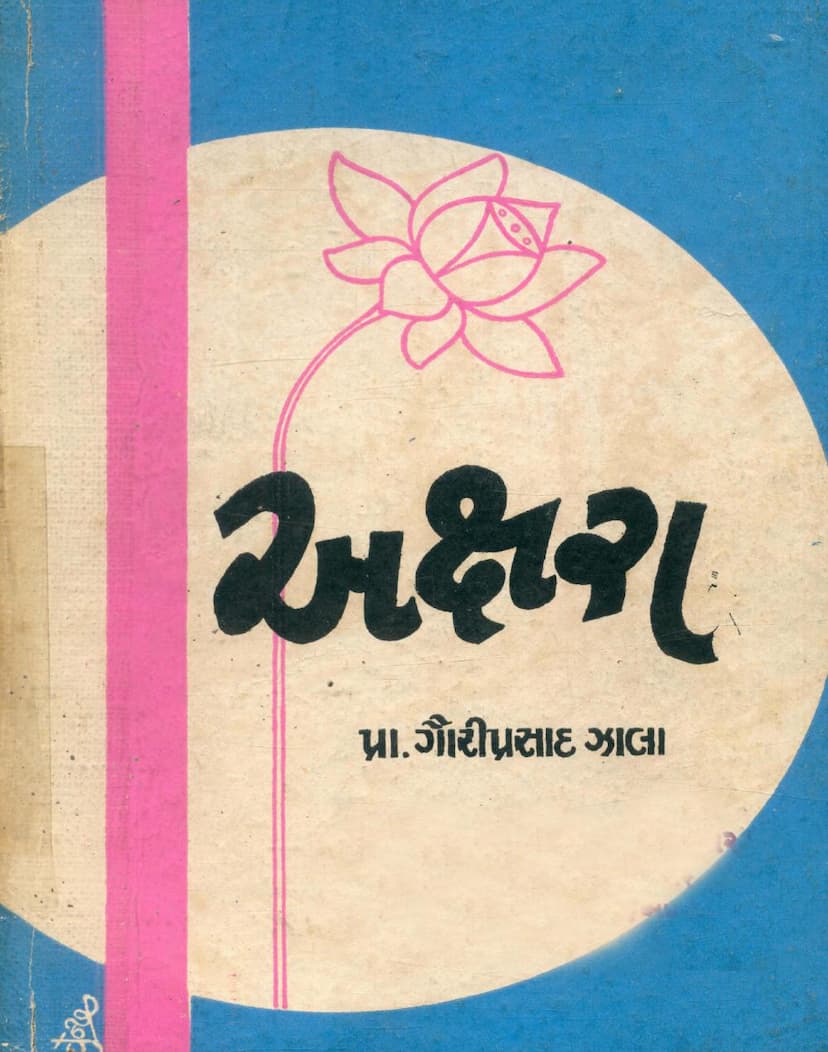Akshara
Added to library: September 1, 2025

Summary
Here is a comprehensive summary of the Jain text "Akshara" based on the provided pages:
Book Title: Akshara (અક્ષરા) Author: Late Prof. Gauriprasad Chu. Zala (સ્વ. પ્રા. ગૌરીપ્રસાદ ચુ. ઝાલા) Editors: Dr. Ramanlal Chi. Shah, Smt. Hiraben Pathak, Prof. Rajendra E. Nanavati, Dr. Ku. Meenal M. Vara (ડૉ. રમણલાલ ચી. શાહે, શ્રીમતી હીરાબહેન પાકિ, પ્રા. રાજેન્દ્ર ઈ. નાણાવટી, ડૉ. કુ. મીનળ મ. વારા) Publisher: Ashok Prakashan, Mumbai (અશોક પ્રકાશન, મુંબઈ) Publication Year: November 1976 (આવૃત્તિ પહેલી : નવેમ્બર ૧૯૭૬) Price: Ten Rupees (મૂહય : દશ રૂપિયા)
Overview:
"Akshara" is a collection of critical essays and observations on Gujarati literature by the late Professor Gauriprasad Zala. The book is a tribute to his significant contributions to literary discourse, following an earlier collection of his Sanskrit literature essays titled "Neerajana." This compilation focuses specifically on his writings concerning Gujarati literature, covering a wide range of topics, authors, and literary forms.
Key Themes and Content:
The book is structured to reflect Professor Zala's intellectual journey and areas of expertise. The essays are broadly categorized and arranged thematically:
-
Focus on Prominent Authors and Thinkers: The collection begins with essays dedicated to seminal figures in Gujarati literature, particularly Govardhanram Tripathi, who was a central figure in Professor Zala's academic interest. The essays delve into Govardhanram's life, his philosophical outlook, his monumental novel "Sarasvatichandra," and his poetic work "Snehamudra." Other significant literary figures discussed include Manilal Dwivedi and Anandshankar Dhruv, exploring their thought processes and contributions. Narmad, considered the pioneer of modern Gujarati literature, is also a prominent subject, highlighting his role as a social reformer and literary innovator.
-
Analysis of Literary Trends and Movements: Professor Zala examines various aspects of modern Gujarati literature, including:
- Criticism: Essays on the nature of criticism, discussing concepts like universality and subjectivity in critical analysis, and forecasting the future of Gujarati literary criticism.
- Poetry: Discussions on modern Gujarati poetry, its evolution, and its engagement with traditional values.
- Drama: An essay focusing on the form of "Abhinaya Natak" (performing play) within Gujarati dramatic literature.
- Prose: Analysis of narrative techniques and the evolution of prose in Gujarati literature, including discussions on the historical context of Gujarati literature in the 1940s.
-
Exploration of Literary Forms and Concepts: The book delves into various literary forms and concepts, including:
- Narrative Analysis: Examining elements of storytelling, the critical review of "Chumalisnu Granthasya Vadmay" (likely referring to literary works of the 1940s), and specific works like Sundaram's "Mrichchhakatik" and Rasiklal Parikh's "Velak."
- Linguistic and Stylistic Discussions: Essays touch upon linguistic nuances, such as the aspiration sound ("Mahapran"), and the debate around the word "Shaivalini" or "Tatini" in the context of Botadkar's poetry.
- Specific Literary Works: Detailed analyses of specific works like "Matsyagandha and Gangeya," and "Jambuswami Ras" are included, offering insights into their literary merit and context.
-
Philosophical and Societal Reflections: Professor Zala's essays also reflect his broader philosophical and societal observations, often viewed through the lens of literature. He discusses the concept of "practical asceticism," the influence of Western culture on Indian society, and the search for spiritual and ethical foundations for individual and societal life. He also touches upon the "life-philosophy of the sadhus of Sundargiri," exploring their unique approach to spiritual and worldly matters.
-
Critical Approach and Method: Professor Zala's critical approach is characterized by its depth, meticulousness, and a keen understanding of both classical Indian literary traditions and modern Western critical theories. He often engaged with different viewpoints, seeking to clarify divergent opinions and understand the underlying principles that drive literary development. The "Nivedan" (Foreword) highlights the intention to present articles in a specific order, starting with Govardhanram and then moving through topics of individual, philosophical discussion, trends, literary genres, reviews, and linguistic analysis.
Significance:
"Akshara" serves as a valuable resource for understanding Professor Gauriprasad Zala's significant contributions to Gujarati literary criticism and scholarship. It offers a comprehensive look at his analytical skills, his deep appreciation for Gujarati literature, and his insightful reflections on the broader cultural and intellectual landscape of his time. The book showcases his ability to connect literary works with philosophical ideas, social realities, and linguistic intricacies. The collaborative effort of the editors in compiling and presenting Professor Zala's work is also acknowledged.
In essence, "Akshara" is a scholarly and insightful collection that illuminates the critical mind of Professor Gauriprasad Zala and provides a rich exploration of Gujarati literature and its intellectual underpinnings.